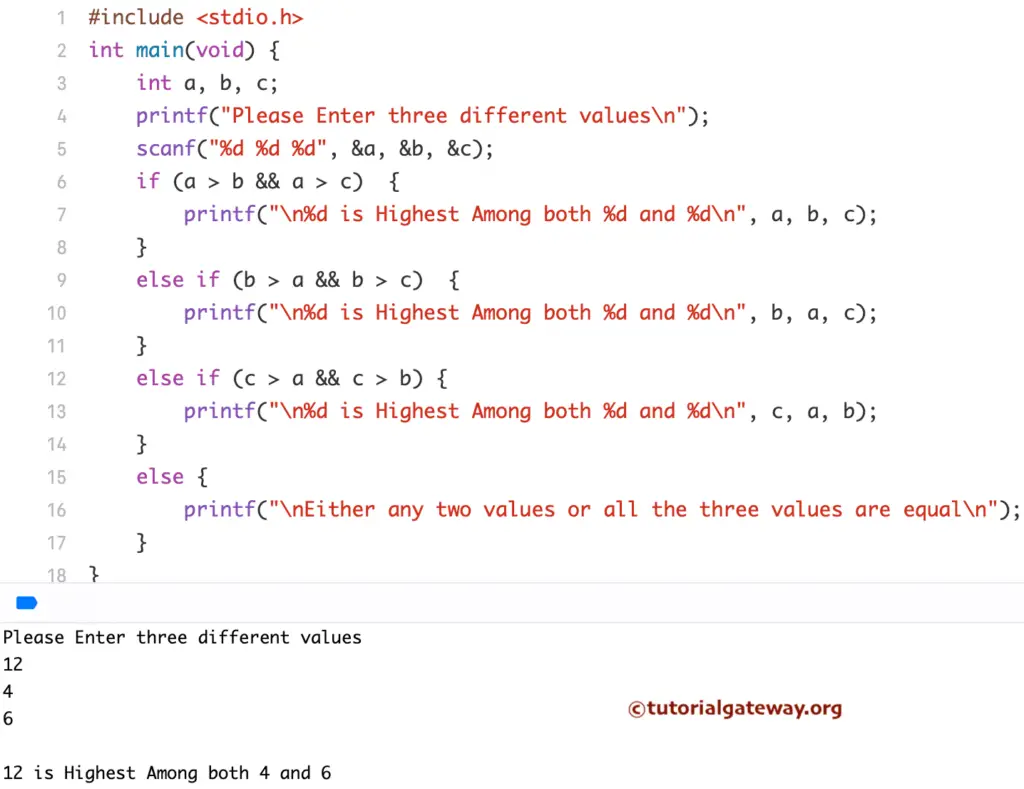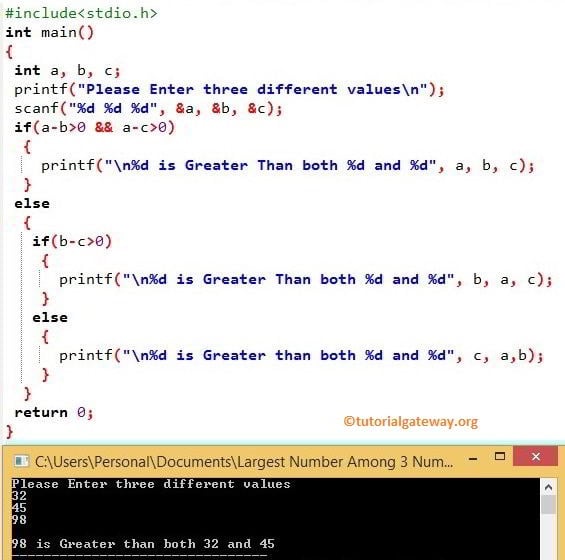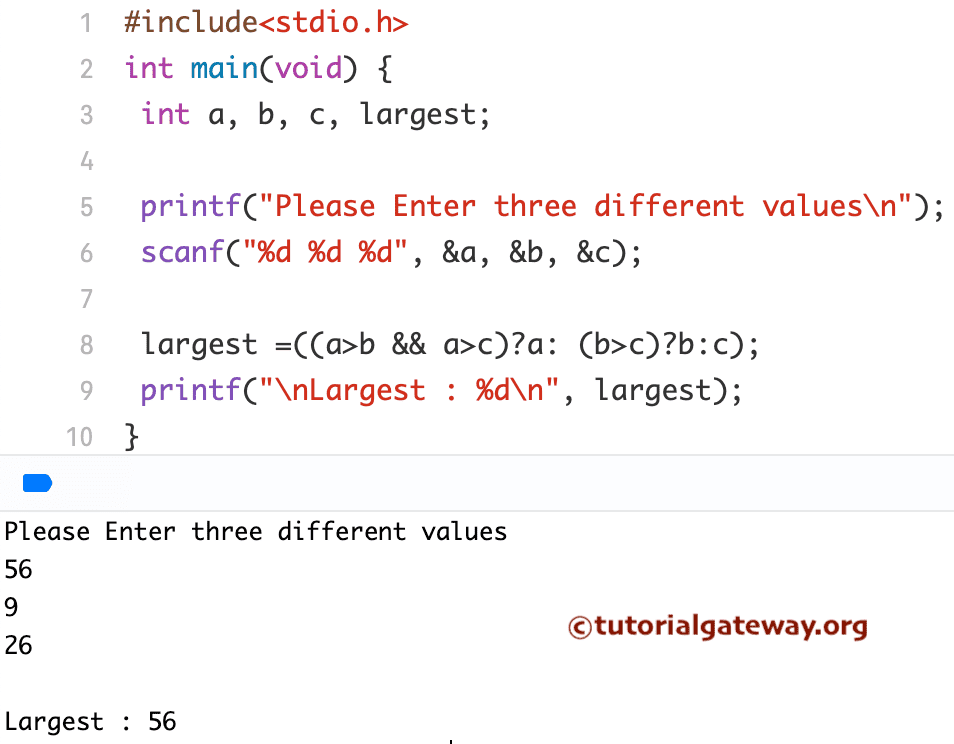In C Programming, there are many approaches to find the largest number of the three numbers. Let me show you how to write a C program to find the largest of three numbers using the Else If Statement, Nested If, and Conditional Operator.
C Program to find Largest of Three numbers using Else If Statement
This program helps the user to enter three different values. Then this C program finds the largest number among three numbers using the Else If Statement.
#include <stdio.h>
int main()
{
int a, b, c;
printf("Please Enter three different values\n");
scanf("%d %d %d", &a, &b, &c);
if (a > b && a > c)
{
printf("\n%d is Highest Among both %d and %d", a, b, c);
}
else if (b > a && b > c)
{
printf("\n%d is Highest Among both %d and %d", b, a, c);
}
else if (c > a && c > b)
{
printf("\n%d is Highest Among both %d and %d", c, a, b);
}
else
{
printf("\nEither any two values or all the three values are equal");
}
return 0;
}
Analysis of the Else If Statement in C Program to Find the Largest of Three Numbers.
- In this example, the first if condition checks whether a is greater than b and a is greater than c. If this condition is True, a is highest among both b and c.
- The first Else if condition checks whether b is greater than a and b is greater than c. If this condition is True, b is highest among both a and c.
- The second Else if condition checks whether c is greater than a and c is greater than b. If this condition is True, c is highest among both a and b.
- If all the above conditions fail, it means they are equal.
Output 1

OUTPUT 2:
Please Enter three different values
19
25
20
25 is Highest Among both 19 and 203rd OUTPUT:
Please Enter three different values
45
36
96
96 is Highest Among both 45 and 36Let’s enter 5 as all three numbers
Please Enter three different values
5
5
5
Either any two values or all the three values are equalC Program to find Largest of Three numbers using Nested If Statement
This program helps the user to enter three different values. Next, this C program finds the Largest of Three numbers using Nested If.
#include<stdio.h>
int main()
{
int a, b, c;
printf("Please Enter three different values\n");
scanf("%d %d %d", &a, &b, &c);
if(a-b>0 && a-c>0)
{
printf("\n%d is Greater Than both %d and %d", a, b, c);
}
else
{
if(b-c>0)
{
printf("\n%d is Greater Than both %d and %d", b, a, c);
}
else
{
printf("\n%d is Greater than both %d and %d", c, a, b);
}
}
return 0;
}
In this C program to find the largest of three numbers example.
- First, if condition checks whether a-b and a-c are greater than 0. If we subtract a small number from a big one, this condition fails. Otherwise, it will be True. If this condition is True, then a is greater than both b and c.
- Else statement will execute when the first If condition is False, so there is no need to check for a value. In the C Programming Else statement, we are inserting one more if condition (Nested IF) to check whether b-c is greater than 0. If this condition is True, then b is greater than both a and c.
- Else c is highest among both a, b.
OUTPUT 1: Lets enter the values a = 32, b = 45, c= 98

Lets enter the values a = 22, b = 5, c= 7
Please Enter three different values
22
5
7
22 is Greater Than both 5 and 7OUTPUT 3:
Please Enter three different values
56
222
98
222 is Greater Than both 56 and 98C Program to find Largest of Three numbers using Conditional Operator
This program helps the user to enter three different values. Next, this C Program finds the largest among three numbers using a Conditional Operator.
#include<stdio.h>
int main()
{
int a, b, c, largest;
printf("Please Enter three different values\n");
scanf("%d %d %d", &a, &b, &c);
largest =((a>b && a>c)?a: (b>c)?b:c);
printf("\nLargest : %d", largest);
return 0;
}
Within this conditional operator example
- We declared an integer variable called the largest, and we assigned this variable to the conditional operator functionality.
- The first condition checks whether a is greater than b and a is greater than c. If this condition is True, it returns the first value after the ? symbol, which is variable a (a is greater than both b, c).
- If the first condition fails, it executes the variable after the : symbol. We are checking one more condition (b>c) using the Nested conditional operator. If this condition is True, it returns the first value after the ? symbol, which is variable b (b is greater than both a and c.
- If the Nested condition fails, return the variable after the : symbol, which is variable c. It means c is greater than both a and b.
OUTPUT 1: Let’s enter the values a= 56, b= 9, c= 26.

output 2:
Please Enter three different values
12
48
39
Largest : 48a= 2, b= 56, c=98
Please Enter three different values
2
56
98
Largest : 98
Comments are closed.